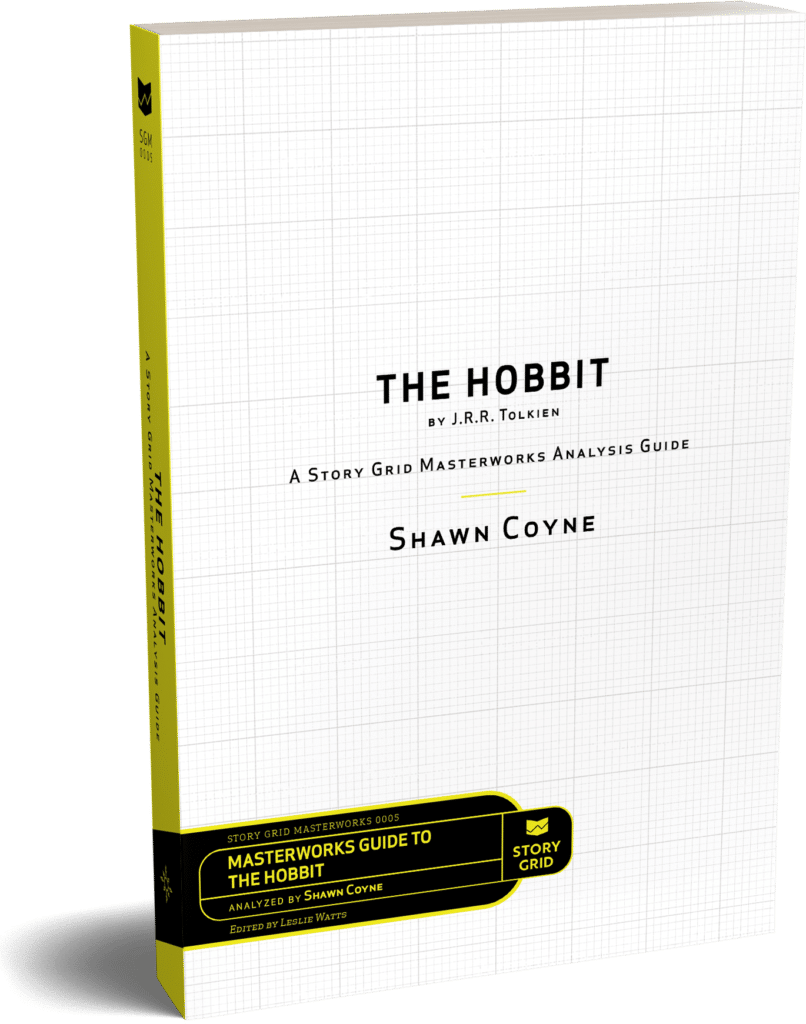The Hobbit by J. R. R. Tolkien: A Story Grid Masterworks Analysis Guide
Written by Shawn CoyneEdited by Leslie Watts
Bilbo Baggins, an altogether respectable hobbit, had never done anything unexpected—to say nothing of heroic—until he met a wizard in a blue pointed hat. After that meeting Bilbo embarked upon an adventure, recorded in the pages of The Hobbit by J. R. R. Tolkien, that captured the imagination of readers around the world.
With unparalleled skill, Tolkien forged scenes of physical courage, revelatory self-transformation, and spiritual transcendence that do more than entertain—they help us make sense of the world.
In this Story Grid Masterworks Analysis Guide, Shawn Coyne examines Bilbo’s transformation and Tolkien’s craft through a powerful new lens, the Heroic Journey 2.0, revealing how stories help us survive, thrive, and find meaning individually and as a species. Using this lens, writers will learn to create the emotional catharsis readers crave and tell stories that cross barriers of time and culture.
Bilbo’s unexpected journey beautifully illustrates the human imperative to keep going, to break and remake our worldviews in a search for truth. But in the end, readers and writers may agree with Coyne that, “There is no final truth, only the creative act of meaning-making in the here and now.”

Purchasing Options

Shawn Coyne is a writer, editor, and publishing professional with over 30 years of experience. He has analyzed, acquired, edited, written, marketed, represented, or published 374 books with many dozens of bestsellers across all genres, and generated over $150,000,000 of revenue.
He graduated in 1986 with a degree in Biology from Harvard College, with a distinction of Magna Cum Laude for his thesis laboratory research work at the Charles A. Dana Laboratory of Toxicology at the Harvard School of Public Health. After Coyne left the laboratory, his findings were acknowledged and served as the inspiration for Mandana Sassanfar and Leona Samson’s Identification and Preliminary Characterization of an 06-Methylguanine DNA Repair Methyltransferase in the Yeast Saccharomyces cerevisiae publication in the venerable The Journal of Biological Chemistry (Vol. 265, No. 1, Issue of January 5, pp. 20-25, 1990).
In 1991, early in his publishing career, Coyne began an independent investigation into the structure, function and organization of narrative, which he has since coined Simulation Synthesis Theory. His synoptic integration of Aristotle’s Poetics, Freytag’s The Technique of the Drama, Campbell’s Hero with a Thousand Faces, McKee’s Story, among many other story structure investigations with contemporary cognitive science, quantum information theory, cybernetics, evolutionary theory, behavioral psychology, Peircean and Jamesian pragmatism, Jungian depth psychology, Theologian and Philosopher Paul Tillich's conception of "ultimate concern," and fighter pilot John Boyd’s OODA loop serves as philosophical, scientific and spiritual foundations for his teaching.
In 2015, he created Story Grid Methodology to begin teaching and further developing Simulation Synthesis Theory. Since then he has given lectures on the origin of story, the integration of storytelling and science, and the necessity of telling complex stories to thousands of students all over the world.
In addition to The Story Grid and Mentoring the Machines, he’s authored, coauthored or ghost-written numerous bestselling nonfiction and fiction titles. His most recent lecture series, “Genre Blueprint” applies his Simulation Synthesis Theory to popular works such as The Hobbit by J.R.R. Tolkien and The Matrix by Lara and Lana Wachowski.

Leslie Watts is a certified Story Grid editor, writer, and podcaster. She’s been writing for as long as she can remember: from her sixth-grade magazine about cats to writing practice while drafting opinions for an appellate court judge.
When the dust settled after her children were born, she launched Writership.com to help writers unearth the treasure in their manuscripts. She believes writers become better storytellers through practice, and that editors owe a duty of care to help writers with specific and supportive guidance to meet reader expectations and express their unique gifts in the world.